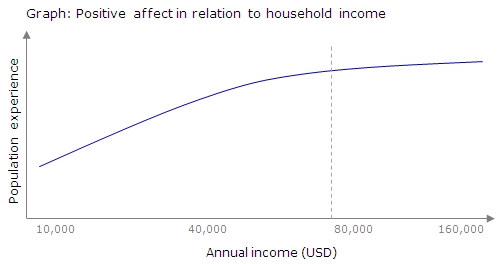Can you really predict what will make you happy?
.
Here’s what most people think will make them happy, in order of importance:
Via The Optimism Bias: A Tour of the Irrationally Positive Brain:
A survey of more than 2,015 people conducted by the British research company Ipsos MORI revealed that people believe the following five factors are most likely to enhance happiness (they are listed in order of importance).
1) More time with family
2) Earning double what I do now
3) Better health
4) More time with friends
5) More traveling
Are they right?
Looking at the research, and sticking with just these five options, the order of importance looks more like this:
1) Better health
2) More time with friends
3) More time with family
4) More traveling
5) Earning double what I do now
How people value health varies dramatically based on age, which probably isn’t too much of a surprise. Tali Sharot points out that:
Only 10 percent of respondents from fifteen to twenty-four years old rated better health as one of the top five factors that would make them happy, as opposed to 45 percent of people over seventy-five.
That said, economists value your health as equivalent to an extra $463,170 a year, dwarfing other factors:
Improvement in health has one of the largest effects on life satisfaction; a move from having a very poor health to having an excellent health is worth around an extra £300,000 a year.
A good deal of research lumps friends and family together. Harvard Happiness expert Daniel Gilbert (author of the bestseller Stumbling on Happiness) sums up much of his research by saying:
We are happy when we have family, we are happy when we have friends and almost all the other things we think make us happy are actually just ways of getting more family and friends.
Having a better social life can be worth as much as an additional $131,232 a year in terms of life satisfaction:
I find that an increase in the level of social involvements is worth up to an extra £85,000 a year in terms of life satisfaction. Actual changes in income, on the other hand, buy very little happiness.
Slumdwellers in Calcutta are much happier than you might expect largely due to relationships.
Travel, in terms of vacations, provides a modest benefit. (Commuting, on the other hand is devastating to happiness and might even end marriages.)
Money, once you get above a pretty good salary, doesn’t add much happiness:

…people in the US who make $75,000 a year…are just as happy as those who make $150,000. Any higher income is not going to increase emotional well-being, but a lower income is associated with less emotional well-being, Scollon explained.
That said, how you spend money can affect how much it increases happiness. And at the risk of splitting hairs, while money has very little effect on moment to moment happiness, it is associated with being more satisfied with your life when looked at in the big picture.
Why do we get it so wrong?
Looking at Daniel Gilbert’s Stumbling on Happiness my main takeaway was this:
Much of our unhappiness springs from the fact that we’re terrible at accurately remembering how things made us feel in the past, so we make bad choices regarding the future.
In Gilbert’s own words (and backed up by many studies):
We overestimate how happy we will be on our birthdays, we underestimate how happy we will be on Monday mornings, and we make these mundane but erroneous predictions again and again, despite their regular disconfirmation.
Do you dread going to work, going to the gym or to that family gathering? How do you really feel when you finally get there or after? It’s often very different from your prediction. Some things that look like an enormous chore to do in the future are actually very fulfilling in the moment and afterward… like, oh, blogging.
Stop trusting your memory. Write things down. Does that seem like work?
Well, Gilbert has a great research-backed suggestion that is quick and easy: Look at other people, what they do, and how they react in the moment:
This trio of studies suggests that when people are deprived of the information that imagination requires and are thus forced to use others as surrogates, they make remarkably accurate predictions about their future feelings, which suggests that the best way to predict our feelings tomorrow is to see how others are feeling today.
Want to learn more about what will make you happy? Go here.
Join over 90,000 readers and get a free weekly update via email here.
Related posts:
How To Be Resilient: 8 Steps To Success When Life Gets Hard
What 10 things should you do every day to improve your life?




